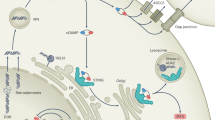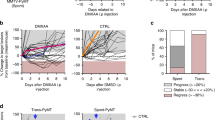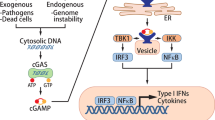Abstract
Synergistic induction of the inducible nitric oxide synthase (NOS II) gene requires a combination of interferon-γ (IFN-γ) and lipopolysaccharide (LPS). In this study, we determined whether the induction of IFN-γ was required for NOS II-mediated antitumor activity in vivo. Highly metastatic H7 murine pancreatic adenocarcinoma cells were implanted into the subcutis, footpad, and pancreas of syngeneic IFN-γ+/+ and IFN-γ−/− mice. These cells grew and produced metastases and ascites in IFN-γ+/+ mice. In sharp contrast, the same tumor cells grew much more aggressively, metastasized more extensively, and produced a larger amount of malignant ascites in IFN-γ−/− mice. Also, induction of IFN-γ correlated with NOS II gene expression and NO production in IFN-γ+/+ injected with the tumor cells but not in IFN-γ−/− mice or IFN-γ+/+ mice without tumor challenge. In vitro, only LPS plus IFN-γ induced a high level of NO production and cytotoxicity against H7 cells. These data suggested that the tumor cells stimulated IFN-γ secretion from host cells, which in turn stimulated NO production by host cells and suppressed tumor growth and metastasis.
This is a preview of subscription content, access via your institution
Access options
Subscribe to this journal
Receive 50 print issues and online access
$259.00 per year
only $5.18 per issue
Buy this article
- Purchase on Springer Link
- Instant access to full article PDF
Prices may be subject to local taxes which are calculated during checkout





Similar content being viewed by others
References
Ambs S, Hussain SP, Harris CC . 1997 FASEB J. 11: 443–448
Chinje EC, Stratford IJ . 1997 Essays Biochem. 32: 61–72
Corbett TH, Roberts BJ, Leopold WR, Peckham JC, Wilkoff LJ, Groswold DP, Schabel Jr FM . 1984 Cancer Res. 44: 717–726
Einhorn S, Grander D . 1996 Interferon Cytokine Res. 16: 275–281
Farrar MA, Schreiber RD . 1993 Annu. Rev. Immunol. 11: 571–611
Gutterman JU . 1994 Proc. Natl. Acad. Sci. USA 91: 1198– 1205
Ignarro LJ, Buga GM, Wood KS, Byrns RE, Chaudhuri G . 1987 Proc. Natl. Acad. Sci. USA 84: 9265–9269
Jaffrey SR, Snyder SH . 1995 Annu. Rev. Cell Dev. Biol. 11: 417–440
Johns TG, Mackay IR, Callister KA, Hertzog PJ, Devenish RJ, Linnane AW . 1992 J. Natl. Cancer. Inst. 84: 1185– 1190
Kaplan D, Shankaran V, Dighe AS, Stockert E, Aguet M, Old LJ, Schreiber RD . 1998 Proc. Natl. Acad. Sci. USA 95: 7556–7561
Krown SE . 1988 J. Natl. Cancer Inst. 80: 306–309
Kundu N, Dorsey R, Jackson MJ, Guiterrez P, Wilson K, Fu S, Ramanujam K, Thomas E, Fulton AM . 1998 Int. J. Cancer 76: 713–719
Lokshin A, Mayotte, JE, Levitt ML . 1995 J. Natl. Cancer Inst. 87: 206–212
Moncada S, Higgs AN . 1993 N. Engl. J. Med. 329: 2002– 2012
Nathan C . 1992 FASEB J. 6: 3051–3064
Onier N, Hilpert S, Reveneau S, Arnould L, Saint-Giorgio V, Exbrayat JM, Jeannin JF . 1999 Int. J. Cancer 81: 755–760
Pestka S, Langer JA, Zoon KC, Samuel CE . 1987 Annu. Rev. Biochem. 56: 727–777
Schmidt HH, Walter U . 1994 Cell 78: 919–925
Shi Q, Huang S, Jiang W, Kutach LS, Ananthaswamy HM, Xie K . 1999 Cancer Res. 59: 2072– 2075
Shi Q, Wang B, Xiong Q, Le X, Khan N, Xie K . 2000 Cancer Res. 60: 2645– 2650
Shi Q, Xie K . 2000 Int. J. Oncol. 17: 217–225
Tannenbaum CS, Hamilton TA . 2000 Semin. Cancer Biol. 10: 113–123
Thomas H, Balkwill FR . 1991 Pharmacol. Ther. 52: 307–330
Tozer GM, Everett SA . 1997 Clin. Oncol. (R. Coll. Radiol.) 9: 357–364
Wang B, Xiong Q, Shi Q, Le X, Abbruzzese JL, Xie K . 2001a Cancer Res. 61: 71–75
Wang B, Xiong Q, Shi Q, Tan D, Le X, Xie K . 2001b Int. J. Cancer 91: 607–611
Wink DA, Vodovotz Y, Laval J, Laval F, Dewhirst MW, Mitchell JB . 1998 Carcinogenesis 19: 711–721
Xie K, Bielenberg D, Huang S, Juang S-H, Dong Z, Fidler IJ . 1997 Clin. Cancer Res. 3: 2189– 2199
Xie K, Fidler IJ . 1998 Cancer Metastasis Rev. 17: 55–75
Xie K, Huang X, Dong Z, Gutman M, Fidler IJ . 1995 Cancer Res. 55: 3123–3131
Zhang JF, Hu C, Geng Y, Selm J, Klein SB, Orazi A, Taylor MW . 1996 Proc. Natl. Acad. Sci. USA 93: 4513–4518
Acknowledgements
We thank Dr Suyun Huang for expert suggestion, Don Norwood for editorial comments, and Judy King for assistance in the preparation of this manuscript. This work was supported by the Lustgarten Pancreatic Cancer Research Foundation, the Research Project Grant #RPG-00-054-01-CMS from the American Cancer Society, and the Cancer Center Support Core Grant CA 16672-23 from the National Cancer Institute, National Institutes of Health (to K Xie).
Author information
Authors and Affiliations
Corresponding author
Rights and permissions
About this article
Cite this article
Wang, B., Xiong, Q., Shi, Q. et al. Genetic disruption of host interferon-γ drastically enhances the metastasis of pancreatic adenocarcinoma through impaired expression of inducible nitric oxide synthase. Oncogene 20, 6930–6937 (2001). https://doi.org/10.1038/sj.onc.1204871
Received:
Revised:
Accepted:
Published:
Issue Date:
DOI: https://doi.org/10.1038/sj.onc.1204871
Keywords
This article is cited by
-
Clinical value of serum interleukin-18 and nitric oxide activities in patients with prostate cancer
The Chinese-German Journal of Clinical Oncology (2011)
-
A novel model system for studying the double-edged roles of nitric oxide production in pancreatic cancer growth and metastasis
Oncogene (2003)



